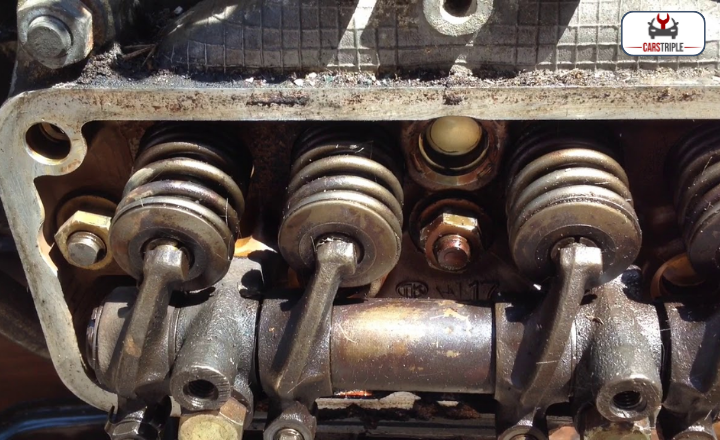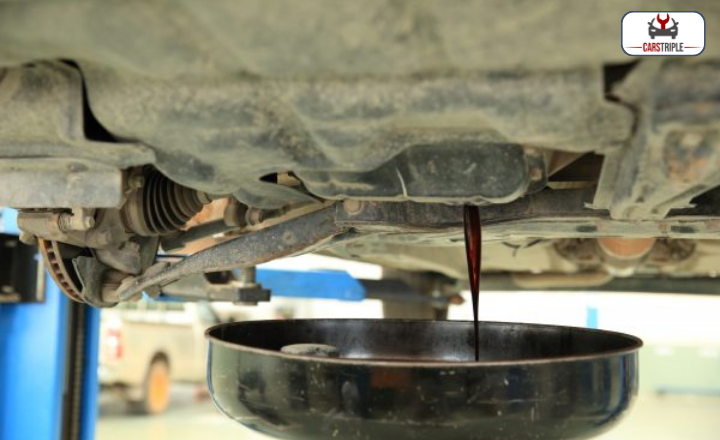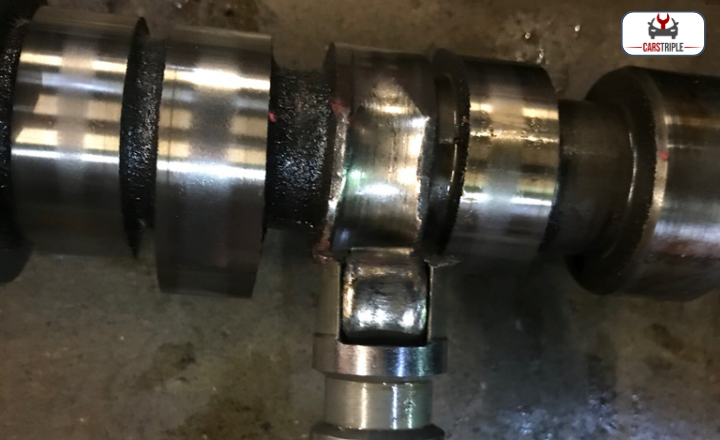Many car owners often face a common problem known as lifter tick. But what does that mean? It’s an annoying ticking sound from the engine’s valve lifters, also called hydraulic tappets. The sound can be so soft you barely notice it or loud enough to worry many drivers.
This article will explain why a lifter tick happens, how to recognize it, and what you can do about it. Let’s better understand this troublesome issue and find out how to silence that ticking noise for a more pleasant drive.
What Is A Lifter Tick?
‘Lifter tick’ means the clicking sound from your car’s engine. It’s made by parts called valve lifters or hydraulic tappets. These parts help keep the proper space between valves in your engine, allowing it to run well without wasting energy. Sometimes, these lifters can wear out or not get enough oil. When this happens, they make a ticking sound.
You might hear this sound more when you start your car, especially after sitting for a while. The ticking sound can also get louder as the engine gets faster. An annoying lifter tick isn’t just a nuisance; it’s also an alert. A problem with your machine should be addressed before it escalates.
5 Symptoms Of Lifter Tick
Here are five major symptoms of the lifter tick.
Ticking Noise
That clicking sound you hear is often linked to the lifter tick problem. This happens when your engine gets hot, and the oil inside it gets thin and can’t quieten the noise made by the lifter. That’s why you hear it more when your engine is idling or running at high speed.

The root of this clicking sound usually comes from insufficient space between the valve and the hydraulic lifters in your engine. These lifters are made to keep a certain amount of space between themselves and your engine’s valves. When they don’t do their job, a small gap appears that makes the ticking noise you’re hearing.
Reduced Engine Performance
The engine may not perform well, when your car’s engine lifters don’t work right. Engine lifters are very important because they help open and close the valves in the engine. Problems with these lifters can cause issues with valve clearance.

This messes up the combustion process inside the engine. Harmful combustion can make the machine less powerful. As a result, your car might feel slow or react slowly when you’re driving.
Poor Fuel Efficiency
Lifter tick can make your car use more fuel. This tick means that the valve lifters in your engine aren’t working right. This can cause many issues inside the engine, like less power and using more gas. This happens because when the valve lifters need to do their job, it messes up how well and when the combustion process occurs in your engine. The engine has to work extra hard and burn more gas to compensate for these problems.
Check Engine Light
Sometimes, the lifter tick might make the check engine light on your dashboard come on. This happens because the engine control module (ECM) monitors different parts of your car’s engine. It lights up the check engine light to warn you, like the lifter tick, when something goes wrong.

The ECM sets a diagnostic trouble code (DTC) about the problem to do this. A skilled mechanic can then use an OBD-II scanner to read this DTC and discover precisely what’s happening.
Excessive Valve Wear
The lifter tick that doesn’t go away can cause a lot of wear and tear on your valves over time. This ticking noise is often because there’s insufficient oil between the lifters and the valves. This causes the metals to rub against each other, wearing them down.
If this continues, the gap between the lifter and the valve gets bigger. This enormous gap can lead to uneven wear on the valve or even harm other valve train parts. The uneven wear might mess with how well your engine works, causing less power and efficiency. In terrible cases, it might even cause your engine to fail.
5 Causes Of Lifter Tick
Here we have mentioned five major causes of the lifter tick.
Insufficient Oil Pressure
Lifter tick often happens because there isn’t enough oil pressure. Hydraulic lifters need the proper oil pressure to correct the valve clearance. They might not support this clearance, and you’ll hear a ticking noise, if the oil pressure drops too much. This noise can also mean that your engine isn’t getting enough lubrication, causing parts to rub together. Over time, this could cause severe damage to your engine.
Dirty or Contaminated Oil

Dirty oil has impurities, it can cause a noise from your engine, known as the lifter tick. Your engine’s hydraulic lifters need clean oil flowing steadily to work right. They are crucial in keeping the correct valve clearance, which makes your engine work its best.
But when the oil has things like sludge or debris, these can block the tiny paths that bring oil to the lifters. This blockage slows the oil flow and stops the lifters from doing their job correctly. That’s when you might start hearing a ticking noise from your engine. It is a lifter tick.
Worn or Damaged Lifters

Worn-out or damaged lifters make ticking noises in your engine. Lifters, also called hydraulic valve lifters or hydraulic lash adjusters, are essential for keeping the correct gap between the camshaft and the valves. These parts can get worn out or broken over time and after much use. When they do, they can’t longer maintain the needed hydraulic pressure.
This drop in pressure causes the wrong valve clearance, which you hear as a ticking noise when your engine is running. It’s crucial to fix this problem quickly because it could cause more severe damage to your engine if not taken care of.
Incorrect Valve Lash Adjustment
Ticking noises can also occur in your engine, when you don’t correctly adjust the space between the rocker arm and the valve stem, known as valve lash. This is often referred to as the lifter tick. The wrong adjustment can prevent the valve from sitting correctly and lead to extra wear on parts of the valve train.
This additional wear can then make a ticking sound. Also, not putting things back together right when fixing an engine can mess up the valve lash adjustment. Getting parts back together right or at the right time could save the space needed for everything to work directly.
Using the Wrong Oil Viscosity
Wrong thickness of oil can also make your engine tick. The oil’s viscosity is critical to ensure your car’s engine works its best. Too thin oil might not create enough pressure to keep the suitable valve space. This could mean metal parts touch each other, and that makes a ticking sound.
Too-thick oil might only move slowly through the engine. This could mean not enough lubrication for the engine parts, and that could lead to lifter problems.
How Do You Fix Lifter Ticks?
Fixing the lifter tick might need different approaches depending on the root issue.
Change the Engine Oil and Filter
Dirty or contaminated oil can cause your car’s engine to make a ticking noise. This is because dirt and other particles build up in the engine oil over time, making it work less effectively. The ticking noise comes from the lifters in your engine not working as well as they should.
To fix this, you should change your engine oil and filter. Ensure you use the correct type of oil for your car – this information can be found in your car’s manual. Use of the right oil will help your engine parts work better and last longer.
It would help if you also considered using a good quality oil additive that’s made to clean and lubricate lifters. This will eliminate dirt or particles and help everything run more smoothly.
Adjust the Valve Lash
Fixing the valve lash can solve problems tied to wrong valve clearance. This fix ensures enough space between the rocker arm and the valve stem. This space lets valves open and close as they should.
A trained mechanic will set this space based on what the car maker says is right, which can change based on your car’s make and model. A valve lash that is too tight or loose can make a ticking sound, often called a ‘lifter tick.’ Fixing the valve lash can eliminate this sound and ensure your engine runs smoothly.
Replace the Worn or Damaged Lifters
Your vehicle needs new lifters when the old ones are worn out or broken. Lifters keep your engine running smoothly. Not replacing bad lifters can cause severe damage to the engine over time.
Only a trained mechanic should do this job because it’s hard work and needs special knowledge about how an engine works inside. The mechanic must put the lifters just right for the best engine performance. Putting them incorrectly could lead to more damage and expensive repairs later.
How Serious Is Lifter Tick?
Don’t ignore the lifter tick. It’s not an urgent issue, but it indicates something is off with your engine’s valve train. If you don’t deal with this ticking noise, it can become a big problem. Constant tapping can cause too much wear on your valves and other valve train parts.
This wear and tear over time can cause a lot of damage. Ignoring the lifter tick for too long could even make your engine fail. So, fixing this problem as soon as you notice it is essential to avoid more issues later on.
Can You Drive With the Lifter Tick?
Driving with lifter tick is possible but only recommended briefly. This noise suggests your car’s valve train parts might be worn out or damaged. Ignoring it could cause more significant issues and expensive fixes later. Seeing signs like poor engine function, a check engine light, and the lifter tick means your car needs urgent care.
Is Lifter Tick Expensive To Fix?
Cost in Fixing the lifter tick can vary based on what’s wrong. An oil change or valve lash adjustment could be a cheap fix. These fixes don’t need much work, and the parts aren’t expensive. But the price can increase significantly when you need to replace the lifters.
This is because new lifters cost more and take more work to put in. It would help if you got a mechanic to check it out so you know what needs fixing and how much it might cost.
Can Regular Maintenance Help Prevent Lifter Tick?
Regular routine maintenance helps a lot to avoid lifter ticks. Changing your oil on time and using the correct oil thickness for your engine’s lifters are essential. The oil works like a slippery layer, cutting down friction between parts, and its thickness helps it stand up to the engine’s heat and pressure.
Not changing your oil as needed or using the wrong thickness can cause more wear and tear on your lifters, making it more likely you’ll get a lifter tick. You should also adjust your valve lash from time to time. These tweaks make sure there’s just enough space between your valves and their parts. Too much freedom can make your lifters start ticking.
How Long Does It Take To Fix the Lifter Tick?

The time it takes to fix the lifter tick can change a lot depending on how complicated the problem is. Solving oil and filter changes takes only one to two hours. Adjusting the valve lash could take longer, especially if your engine makes accessing the valves difficult.
More severe problems, like replacing worn or damaged lifters, could take much time. It may take several hours or a whole day. This mostly depends on your engine’s complexity and your mechanic’s skill.
Will Lifter Tick Eventually Go Away On Its Own?
Lifter tick can fix itself, especially when things like oil thickness or short-term lack of oil cause it. But this only occasionally happens. You might see the problem disappear when you use thicker oil or fix the oil level. But these are just quick fixes that need to tackle the main problem.
Lifter tick that keeps coming back could mean more significant issues with your engine. It’s best to get professional help when the ticking noise stops or worsens over time. A trained mechanic can find and solve the real problem, which helps avoid possible harm to your car’s engine. Pay attention to this noise briefly to prevent costly repairs later on.
Conclusion
Don’t ignore a lifter tick, thinking it’s just an annoying noise. It might indicate a serious issue. This small sound could be a warning of major engine problems that will cost you a lot to repair. You should figure out the cause of this ticking sound as soon as you hear it. Maintaining your car and addressing odd noises promptly can prevent bigger car issues from developing. Therefore, don’t overlook the lifter tick; consider it a signal that your car needs immediate inspection and repair.
FAQ’s
How does inadequate lubrication cause the lifter tick?
Insufficient lubrication causes increased friction between the mechanical parts of the engine, leading to wear and tear that can result in ticking noises.
What is involved in fixing the lifter tick?
Fixing this issue often involves replacing worn-out or damaged lifters, which should always be left to qualified professionals due to the complexity of the task.
